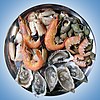Duck as food
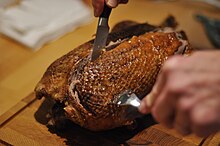 | |
This article needs additional citations for verification. (February 2013) |
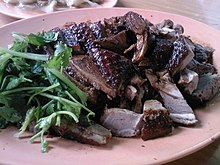
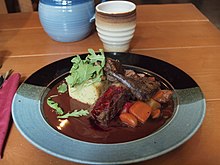
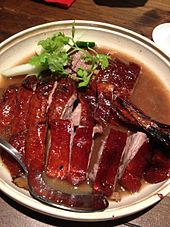
In cooking and gastronomy, duck or duckling is the meat of several species of bird in the family Anatidae, found in both fresh and salt water. Duck is eaten in many cuisines around the world. It is a high-fat, high-protein meat rich in iron. Duckling nominally comes from a juvenile animal, but may be simply a menu name.
One species of freshwater duck, the mallard, has been domesticated; the domesticated duck is a common livestock bird in a variety of cultures. The Pekin duck is another livestock breed of importance, particularly in North America. Magret refers specifically to the breast of a mulard or Muscovy (or Barbary) duck that has been force fed to produce foie gras.[1]
Duck meat
[edit]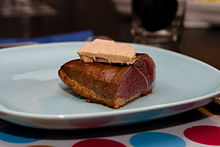
Duck is particularly predominant in the Chinese cuisine—a popular dish is Peking duck. Duck meat is commonly eaten with scallions, cucumbers and hoisin sauce wrapped in a small spring pancake made of flour and water or a soft, risen bun known as gua bao. In Cantonese cuisine, the roasted duck or siu aap (燒鴨) is produced by Siu mei BBQ shops; siu app is offered whole or in halves, and commonly as part of take-out with steamed white rice and vegetables. Siu app can also be served as part of the barbecue platter appetizer (the first of a ten-course Chinese banquet meal) in combination with char siu (roasted pork), soy sauce chicken, yu chu (roasted suckling pig) or siu yuk (roasted pig belly), and jellyfish.
Duck meat is also a part of Indian cuisine, especially important in Northeast India,[2] such as in the Assamese cuisine.[3][4] The old Assamese text Kamarupa Yatra discusses duck meat, squab and tortoise meat. Popular dishes include duck with white gourd, duck with laixak and duck with bamboo shoot.[5] Duck meat and squab are also cooked with banana blossom.[6] It is popular among both the tribal[7][8] and non-tribal populations.
The Pekin duck is also the most common duck meat consumed in the United States, and according to the USDA, about 39 million ducks are raised each year for meat. [9] Because most commercially raised Pekins come from Long Island, New York, Pekins are also sometimes called "Long Island" ducks, despite being of Chinese origin. Some specialty breeds have become more popular in recent years, notably the Muscovy duck and the mulard duck (a sterile hybrid of Pekins and Muscovies).[10] Unlike most other domesticated ducks, Muscovy ducks are not descended from mallards.
Duck egg
[edit]Nutrition
[edit]Duck meat is very high in cholesterol and fat, particularly saturated fat. It is also very high in protein and iron.[11]
Duck dishes
[edit]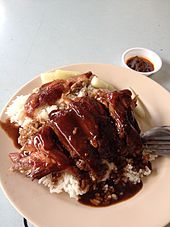
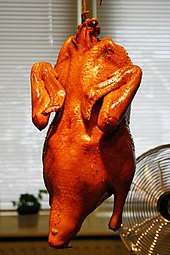
Duck is used in a variety of dishes around the world, most of which involve roasting for at least part of the cooking process to aid in crisping the skin. Some dishes use parts of the duck as an ingredient along with other ingredients. Notable duck dishes include:
- Almond pressed duck
- Ballotine
- Balut is a developing bird embryo boiled and eaten from the shell. It is sold as street-food in the Philippines and around Southeast Asia.[12]
- Bebek Betutu – a famous traditional dish from Bali, Indonesia. The duck is seasoned with pungent roots and various herbs, wrapped with banana leaves, and roasted.
- Chicken and duck blood soup
- Duck blood and vermicelli soup
- Duck confit – duck legs that have been cured (partly or fully) in salt, then marinated and poached in duck fat, typically with garlic and other herbs. The French word confit means "preserved", and the French name for duck confit is "confit de canard".
- Czernina – a sweet and sour Polish soup made of duck blood and clear poultry broth. It was considered a symbol of Polish culture until the 19th century, customarily served to young men and is even featured as a plot device in a famous epic poem called Pan Tadeusz.
- Duck à l'orange – a classic French dish in which the duck is roasted and served with an orange sauce
- Duck rice – a traditional Singaporean dish made of braised or roast duck and white rice
- Duck Bamboo Curry – a traditional dish of Sylhet region in Bangladesh
- Duck Bhuna - a popular food in Bangladesh and have several variants. Some of them are cooked with coconut milk, and some use Chui Jhal to cook this item. It is served with rice or Roti.
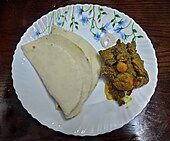
- Foie gras – a specially fattened and rich liver, or a pâté made from the liver, sometimes taken from a goose but usually from a duck
- Long Island roast duckling – this is a whole roasted bird, sometimes brined previously. When done properly, most of the fat melts off during the cooking process, leaving a crispy skin and well-done meat. Some restaurants on Long Island serve this dish with a cherry sauce.
- Guyanese duck curry[13]
- Kamo Nanban – soba or udon with duck meat and leeks
- Lemon duck
- Nanjing salted duck
- Oritang – a variety of guk, Korean soup made with duck and various vegetables[14]
- Peking duck – a famous Chinese dish originating from Beijing, prepared since the Ming Dynasty era. It is prized for the thin, crispy skin, with authentic versions of the dish serving mostly the skin and little meat, and eaten with pancakes, scallions, and hoisin sauce or sweet bean sauce.
- Pressed duck – a complex dish originally from Rouen, France
- Rouennaise sauce – prepared using puréed duck liver as an ingredient
- Tiết canh
- Turducken – an American dish that comprises a turkey, stuffed with a duck, which is in turn stuffed with a chicken.
- Wuhan duck
- Yuhwang ori
- Zhangcha duck – a quintessential dish of Sichuan cuisine. It is prepared by smoking a marinated duck over tea leaves and twigs of the camphor plant, then steamed, and finally deep fried for a crisp finish. Also called tea-smoked duck.
Possibility of pollution contaminating wild duck
[edit]An article in The New York Times in 1981 reported that ducks caught in the wild may be contaminated from pollution of rivers and other bodies of water, because they eat fish and other aquatic life. In particular, PCBs may pose a health risk for those who eat wild duck frequently.[15][needs update]
References
[edit]- ^ "Magret definition". Cdkitchen.com. Retrieved 6 February 2012.
- ^ Hauzel, Hoihnu (2014). Essential North-East Cookbook. Penguin.
- ^ Dutta, Parasmoni (2008). "Physical Folklife of Assam" (PDF). Folklife. 31: 20–21 – via Academia.edu.[dead link]
- ^ Saikia, Arani (2013). "Food habits in pre-colonial Assam". International Journal of Humanities and Social Science Invention. 2 (6): 1–5 – via Academia.edu.[permanent dead link]
- ^ Bharali, Dimpal; Akoijam, Sunildro L. S. (2019). "Culinary Tourism as a Destination Branding: A Case Study of Assam". Emerging Trends in Indian Tourism and Hospitality: Transformation and Innovation: 216. ISBN 9789383419760.
- ^ Sarma, Upasana; Govila, Viney Kumar; Yadav, Akansha (2020). "The traditional and therapeutic use of banana and its plant based delicacies in ethnic Assamese cuisine and religious rituals from Northeast India" (PDF). Journal of Ethnic Foods. 7: 1–7. doi:10.1186/s42779-020-00053-5. S2CID 219530329.
- ^ Boro, Franky. "GLIMPSES OF TRADITIONAL FOOD HABITS, DRESS AND ORNAMENTS: A STUDY AMONG THE BODOS OF UDALGURI DISTRICT IN ASSAM" (PDF). ARF Journal. Archived from the original (PDF) on 16 June 2022. Retrieved 4 November 2021.
- ^ Kumari, Pratisha (2014). "The Mising foodways: an analytical study on the foods and food related cultural practices of the Misings of Assam" (PDF). Tezpur University Ernet.
- ^ "FoodSubs: Cultured Milk Products: Ingredient Substitutions and Ingredient Synonyms".
- ^ "Domestic Ducks". Duckhealth.com. Archived from the original on 15 October 2013. Retrieved 6 February 2012.
- ^ "Duck, domesticated, meat only, cooked, roasted - 0.5 duck USDA". Nutritionix.com.
- ^ "Balut: Fertilized duck eggs and their role in filipino culture - page 2 | Western Folklore". Archived from the original on 14 July 2010. Retrieved 22 June 2016.
- ^ Bibi Sazieda Jabar (2011). Guyanese Style Cooking. iUniverse. p. 84. ISBN 978-1-4620-6336-9.
- ^ 오리탕 (in Korean). Doosan Encyclopedia. Archived from the original on 9 December 2012.
- ^ Faber, Harold (8 October 1981). "HUNTERS WHO EAT DUCKS WARNED ON PCB HAZARD". The New York Times.
Further reading
[edit]- Rombauer, Irma S., et al. Joy of Cooking, Scribner, 1997. ISBN 0-684-81870-1.


